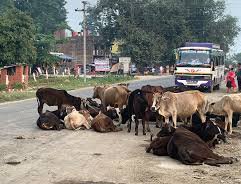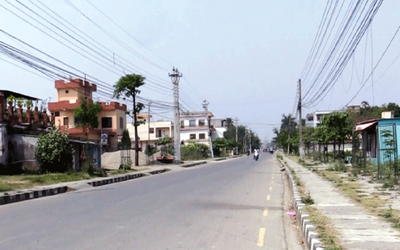
Background
Unclaimed cattle especially in the urban areas of Terai and along the main highways have remained as a problem for urban environmental management. Nepal’s Emission Reduction Program Idea Note (ER-PIN) recognized grazing is one of the major drivers of forest degradation. Especially in the low land area, unproductive cattle are being roared in and around the forests. Such a phenomenon is not only degrading the condition of the forests by trampling and scrambling but also prevent the regeneration of the forests by grazing and browsing the seedlings and saplings. These cattle are also responsible for causing road accident in highways.. Having these aforementioned challenges, a mega concept is postulated hereby. An objective of this article is to disseminate the conceptualized thought among wider stakeholder who is willing to manage the Nepalese forests. We propose the following methodology for managing unclaimed cattle in Nepal for ecological as well as socio-economic benefits. Also, some remarkable benefits that can be earned from the project are highlighted herewith.
Formation of Management Team and Detail Plan
The initial activity is to formulate a detail project plan which is a continuous project. A generous project management team with a manager and staffs including livestock technicians needs to be employed in that project. A detail business plan fulfilling the legal provisions for the process is another step to pace ahead. The initial investment is the untold truth that most of the projects having excellent vision and concepts are on the verge of failurewith funding shortage. Segregation of detail activities in the initial stage and their respective cost estimation gives the final shape of the plan of a project. Preliminary survey and feasibility study also could be done in this stage.
Allocation of Suitable Site
There could be 5 major places where suitable lands need to be allocated for the projects in private or in denuded or public land. Tentative places may be Kailali district (centre from Kanchanpur, Dadeldhura and Kailali itself), Banke district (centre from Bardia, Bankeand Dang), Rupandehi district (centreKapilvastu, Rupandehi, Nawalparasi –both east and west), Makawanpur district (Tanahun, Chitwan, Makawanpur, Bara, Parsa), and Sunsari district (rest of eastern-Terai districts).
Collection of Cattle
Unclaimed cattle should be collected from different districts where the problem level is high. These cattle should be kept in the nearby collection centre Public awareness rising to leave their unproductive cattle in the cattle collection centre is needed. A provision of fine or penalty is to be assigned for the cattle owner who leaves their cattle in public places including forests.
Biogas Plant Establishment
It is a quite high potential option for the same project to run a community biogas plants within the project site. The dung based biogas plant can be connected within the vicinity as a model. Nominal tariff can be charged from the bio-gas connectivity and installation of meter for the first time. This charge can be an expense for fodder collection to the cattle and running cost for the project.
Production of Dairy Products
Not all the unclaimed cattle are age-old rather there could also be cattle which have a high potential for milk production. Shifting from cattle-based economy to the employment and other business based livelihood option changing the cattle farming scheme in the countryside. This situation brought the cattle in public places rather in private ownership. Evolution of genetic engineering and artificial semen technology can improve the local breed of cattle into hybrid on with desired characters. This technology also helps in the project running aim. Varieties of dairy products have very high demand in the market in and around the proposed project centres.
Vulture Conservation
One of the aim and commitment of the governments is to conserve biodiversity. Especially for vultures' conservation, more than half dozen of vulture restaurants are in operation from government and civil society side. These projects also foster vulture conservation aim side by side. This objective can be fulfilled by assigning a piece of land, aside from the core area of the project, to rare the age-old cattle and male one.
Employment Generation
A huge number of skilled and unskilled employment can be generated from this project. Unskilled manpower will be engaged in the raring and caring of cattle, collection of cattle from public land, selling of dairy products to the markets, labour work in bio-gas maintenance etc. within the project. Skilled man forces have as many opportunities as to that of unskilled ones. Artificial insemination, vulture restaurant running, bio-gas plants installation and supervisions, vehicles driving, vulture based research and tourism promotion etc. are some of the range of activities in which experts can be engaged in.
To Sum Up
Constitution of Nepal enshrined the importance of forests and therefore,the government will maintain the required amount of forested area within the country. Also, in the annexes of the constitution, all governments have their respective role for forests and environmental concerns within the country's territory. Moreover, Local Governance Operation Act, 2074 has provisioned the management of unclaimed cattle within the territory within each local level is it's own. Furthermore, it is very crucial to prevent the forests, especially in the Terai Arc Landscape (TAL) area for its additional benefits i.e. carbon benefits under the undergoing negotiation process of carbon trade. The methodology and project we proposed here have multiple benefits not only for environmental perspectives but also in terms of economic and socio-cultural achievements. Hence, attention from all levels of governments and their development partners such as international development partners, non-government organizations, community-based organizations, private sectors can take the lead in this regards.
Pandey is an under Secretary, Ministry of Forests and Environment and Paudel Forest Officer, Ministry of Industry, Tourism, Forests and Environment, Gandaki Province, Nepal.

















